NSG 210
West Kentucky Community And Technical College
All 39 results
Sort by
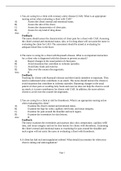
-
Chapter 25, Caring for Clients With Disorders of Coronary
- Exam (elaborations) • 12 pages • 2022
-
- $8.49
- + learn more
1.You are caring for a client with coronary artery disease (CAD). What is an appropriate nursing action when evaluating a client with CAD? A) Assess the client's mental and emotional status. B) Assess the skin of the client. C) Assess the characteristics of chest pain. D) Assess for any kind of drug abuse. Ans: C Feedback: The nurse should assess the characteristics of chest pain for a client with CAD. Assessing the client's mental and emotional status, skin, or for drug abuse will no...
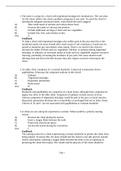
-
Chapter 37, Caring for Clients With Central and Periphera.
- Exam (elaborations) • 12 pages • 2022
-
- $8.49
- + learn more
1.The nurse is caring for a client with trigeminal neuralgia (tic douloureux). The care plan for this client reflects the client's problem eating due to jaw pain. To assist the client in meeting the adequate nutritional needs, what should the nurse suggest? A) Take small meals of nutrient and calorie-dense food. B) Increase the intake of calcium and proteins. C) Include additional servings of fruits and raw vegetables. D) Include fish, liver, and chicken in diet. Ans: A Feedback: To he...
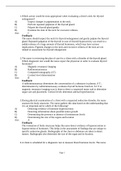
-
Chapter 49, Introduction to the Endocrine System
- Exam (elaborations) • 11 pages • 2022
-
- $8.49
- + learn more
1.Which action would be most appropriate when evaluating a client's neck for thyroid enlargement? A) Inspect changes in pigmentation in the neck. B) Perform repeated palpation of the thyroid gland. C) Palpate the thyroid gland gently. D) Examine the skin of the neck for excessive oiliness. Ans: C Feedback: The nurse should inspect the neck for thyroid enlargement and gently palpate the thyroid gland. Repeated palpation of the thyroid in case of thyroid hyperactivity can result in a su...
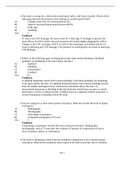
-
Chapter 39, Caring for Clients With Head and Spinal Cord Trauma.
- Exam (elaborations) • 13 pages • 2022
-
- $8.49
- + learn more
e nurse is caring for a client with a head injury after a fall from a hayloft. Which of the following indicates the presence of/or leaking of cerebral spinal fluid? A) Change in the level of consciousness (LOC) B) Signs of increased intracranial pressure (IICP) C) Halo sign D) Swelling Ans: C Feedback: To detect any CSF drainage, the nurse looks for a halo sign. If drainage is present, the nurse allows it to flow freely onto porous gauze and avoids tightly plugging the orifice. Change ...
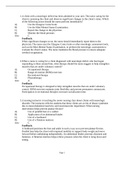
-
Chapter 40, Caring for Clients With Neurologic Deficits.
- Exam (elaborations) • 13 pages • 2022
-
- $9.49
- + learn more
1.A client with a neurologic deficit has been admitted to your unit. The nurse caring for the client is assessing the client and observes significant changes in the client's status. Which of the following action should the nurse perform immediately? A) Use the Glasgow Coma Scale. B) Use the Mini-Mental Status Examination. C) Report the change to the physician. D) Monitor the blood pressure. Ans: C Feedback: When significant changes occur, the nurse should immediately report them to the...
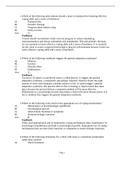
-
Chapter 67, Interaction of Body and Mind.
- Exam (elaborations) • 10 pages • 2022
-
- $8.49
- + learn more
1.Which of the following interventions should a nurse recommend for fostering effective coping skills and a sense of hardiness? A) Balanced diet B) Periodic checkup C) Nonprescribed sedative drug D) Daily exercise Ans: D Feedback: A nurse should recommend a daily exercise program to reduce stimulating neurotransmitters and release endorphins and enkephalins. Diet and periodic checkups are not essential to foster effective coping skills and a sense of hardiness. It is essential for the...
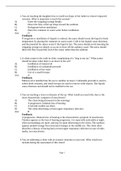
-
Chapter 43, Caring for Clients With Ear Disorders.
- Exam (elaborations) • 12 pages • 2022
-
- $8.49
- + learn more
1.You are teaching the daughter how to instill ear drops of her father to remove impacted cerumen. What is important to teach this woman? A) Insert the irrigating syringe deeply. B) Direct the flow of the ear drops toward the eardrum. C) Refrigerate before instillation. D) Place the container in warm water before instillation. Ans: D Feedback: If irrigation or instillation of liquids is ordered, the nurse should warm the liquid to body temperature by placing the container in warm water....
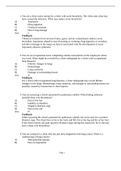
-
Chapter 21, Caring for Clients With Lower Respiratory Disorders.
- Exam (elaborations) • 12 pages • 2022
-
- $9.49
- + learn more
1.You are a clinic nurse caring for a client with acute bronchitis. The client asks what may have caused the infection. What may induce acute bronchitis? A) Aspiration B) Drug ingestion C) Chemical irritation D) Direct lung damage Ans: C Feedback: Chemical irritation from noxious fumes, gases, and air contaminants induces acute bronchitis. Aspiration related to near drowning or vomiting, drug ingestion or overdose, and direct damage to the lungs are factors associated with the developm...
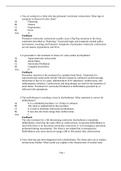
-
Chapter 26, Caring for Clients With Cardiac Dysrhythmias
- Exam (elaborations) • 12 pages • 2022
-
- $9.49
- + learn more
1.You are caring for a client who has premature ventricular contractions. What sign or symptom is observed in this client? A) Fluttering B) Nausea C) Hypotension D) Fever Ans: A Feedback: Premature ventricular contractions usually cause a flip-flop sensation in the chest, sometimes described as “fluttering.” Associated signs and symptoms include pallor, nervousness, sweating, and faintness. Symptoms of premature ventricular contractions are not nausea, hypotension, and fever. 2.A...
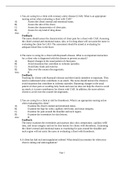
-
Chapter 25, Caring for Clients With Disorders of Coronary
- Exam (elaborations) • 12 pages • 2022
-
- $8.49
- + learn more
1.You are caring for a client with coronary artery disease (CAD). What is an appropriate nursing action when evaluating a client with CAD? A) Assess the client's mental and emotional status. B) Assess the skin of the client. C) Assess the characteristics of chest pain. D) Assess for any kind of drug abuse. Ans: C Feedback: The nurse should assess the characteristics of chest pain for a client with CAD. Assessing the client's mental and emotional status, skin, or for drug abuse will no...

How much did you already spend on Stuvia? Imagine there are plenty more of you out there paying for study notes, but this time YOU are the seller. Ka-ching! Discover all about earning on Stuvia


